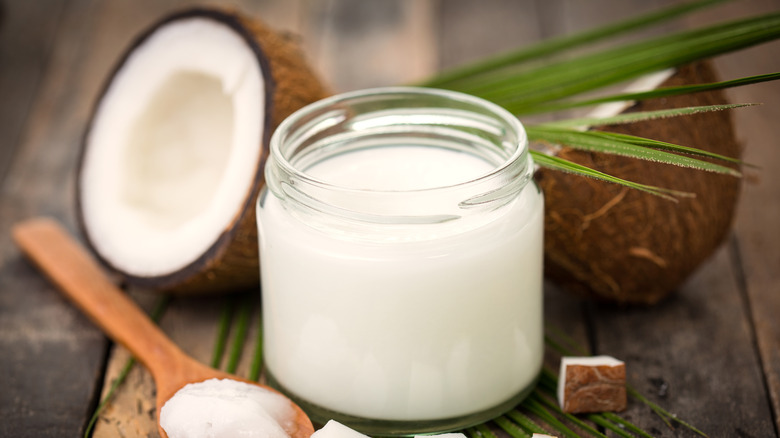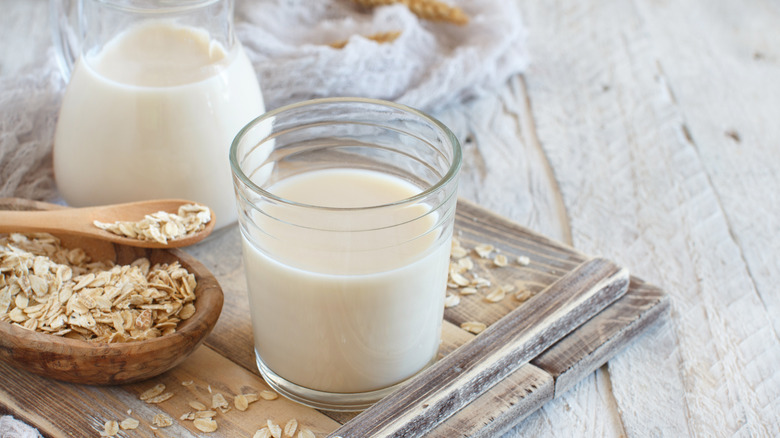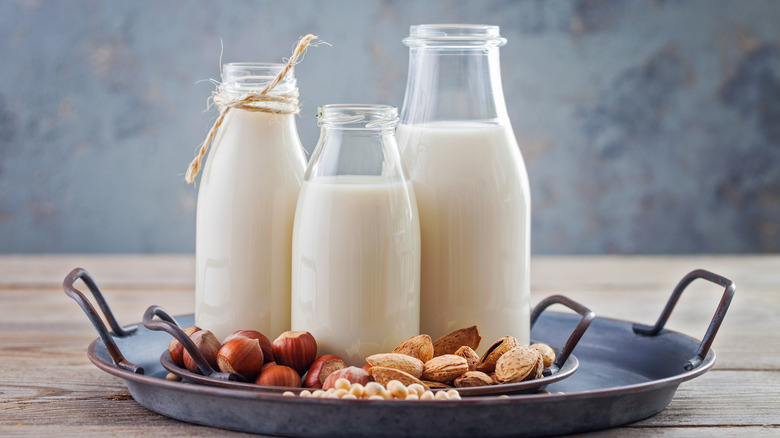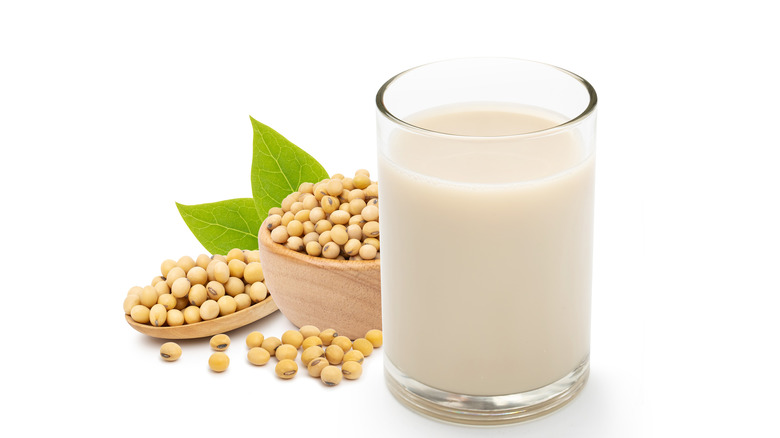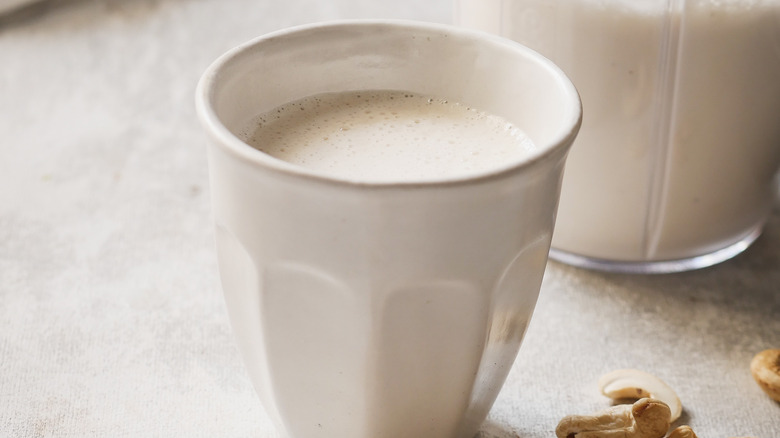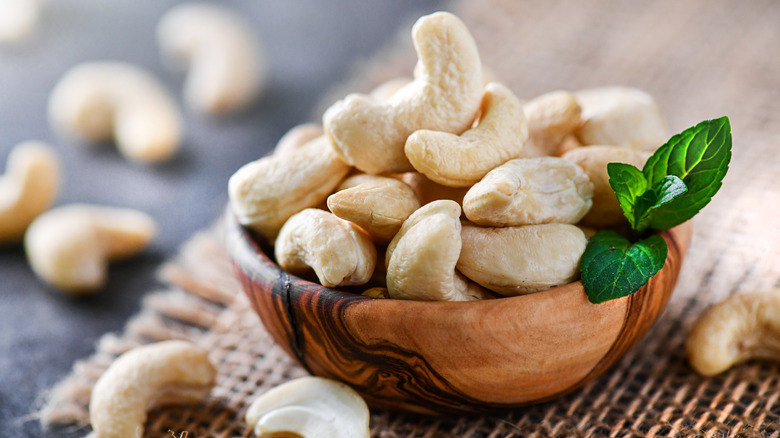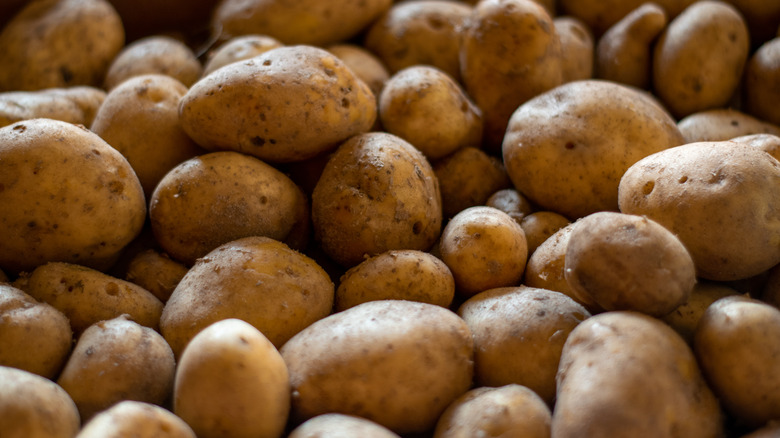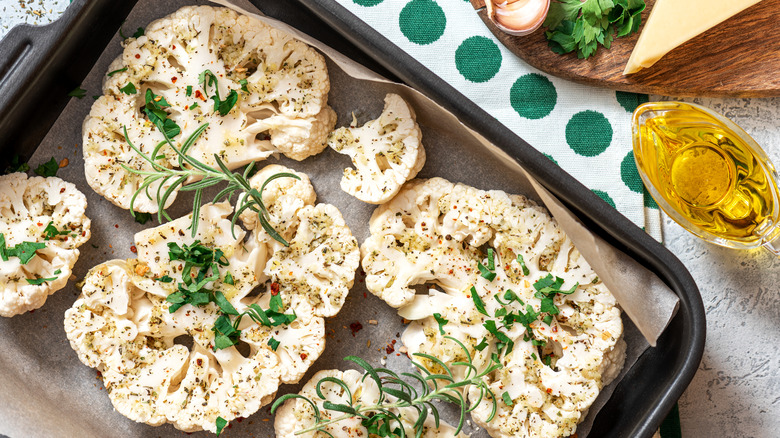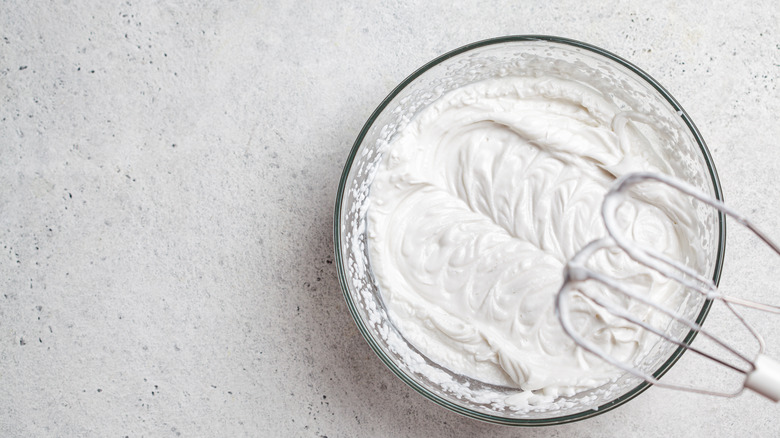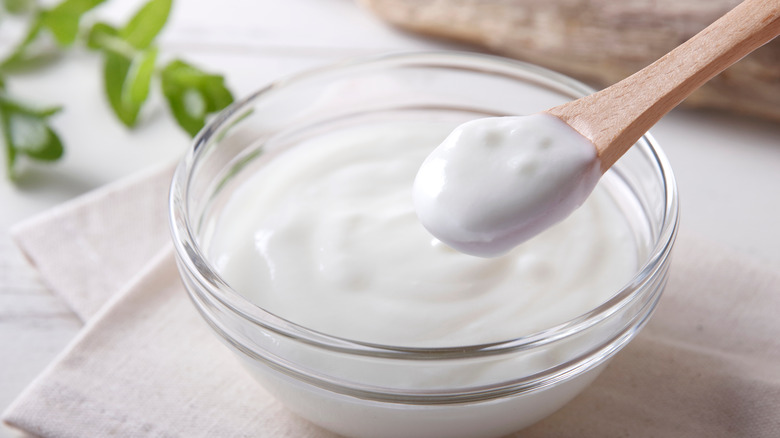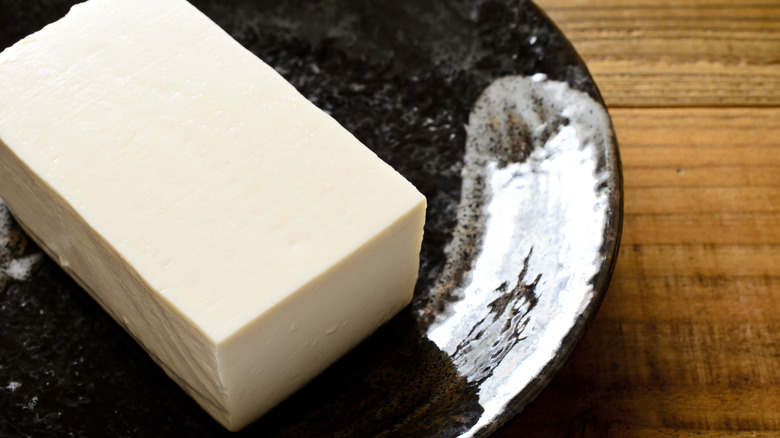10 Best Substitutes For Coconut Milk
Coconut milk is rising in popularity as a dairy-free substitute, with Dunkin' just recently releasing it as an option on its menu in April 2021, according to the popular chain's website. And this choice was not made without good reason — the beverage has many attractive benefits including containing the lowest carbs of the non-dairy milks, being only one-third the calories of cow's milk, and acting as a good source of healthy fats, according to Healthline.
In addition, coconut milk is well-renowned for its creamy consistency, which can add lots of flavor and texture to desserts, soups, and dips. It is sold in both boxed and canned varieties, with the latter often containing "coconut cream" at the top when opened. This cream is extremely valuable in making a lot of vegan varieties of ice cream, mashed potatoes, and whipped toppings, all of which get their creamy texture without the use of dairy.
However, despite its growing popularity, having coconut milk readily available or dealing with food allergies to the drupe can make it tricky to use in recipes. But, have no fear, because here's a comprehensive list of alternatives for the popular beverage to use during the times you don't have it on hand.
1. Oat milk
Oat milk has definitely amassed its cult following in recent years, with the emergence of popular niche manufacturers such as Oatly and Planet Oat. And how can you not be a fan? Being naturally nut and dairy-free makes this beverage extremely attractive, in the diets of vegans and omnivores alike.
Like coconut milk, it has a naturally creamy consistency, due to oats being more nutrient-dense than most nuts, and therefore able to retain more water when blended into milk, according to Eating Well. This makes oat milk a great substitute for coconut milk in smoothies, desserts, and other breakfast items. Also, similar to coconut milk, oat milk is frequently offered as a creamer option in most coffee shops, with Starbucks just adding the option to all its stores in March 2021. Nowadays, it's rare to find a supermarket that doesn't sell oat milk. If you go down the aisle of almost any supermarket, you'll be greeted with a plethora of different oat milk options. Whether you're deciding between Chobani and Califia Farms, or choosing between extra creamy and chocolate, you'll never leave the store disappointed with what you got.
In coffee beverages, particularly lattes, oat and coconut milk can be swapped in equal quantities, according to Healthline.
2. Almond milk
Almond milk is known for being low-calorie and one of the first popular non-dairy milks, so you'd expect its appearance on this list. Despite not having coconut milk's distinct flavor and creaminess, almond milk can make an easy substitute in beverages and baked goods. Almond milk is also popular in many dairy-free sweets — many Ben and Jerry's non-dairy pints are made with an almond milk base! However, as stated before, almond milk does not possess the same thickness as coconut milk, due to having a lower fat content, making it more difficult to implement into more savory dishes, according to Healthline.
Nonetheless, in the instance of many sweets, almond milk can be interchanged with coconut milk in equal quantities. The only thing that would really differ is the absence of the coconut's creamy consistency and the addition of a slightly nutty flavor if almond milk was used instead.
3. Soy milk
Arguably thought of as the pioneer of the dairy-free milks, soy milk originated in China as a traditionally hot beverage, and rose to popularity in the 1980s in the West, according to Soy Info Center. Soy milk is often compared as the closest to dairy milks, because it has similar levels of protein and amino acids, according to Healthline. In most recipes, soy milk can be swapped with coconut milk in 1:1 ratios (via Healthline). However, it is known for being a little sweet and will lack the natural coconut flavoring that many coconut recipes call for.
According to Allrecipes, soy milk is the best milk for baking, due to its neutral flavor and high protein content, causing baked goods to brown as if they were made with dairy products. Therefore, if your go-to milk is coconut milk, but maybe you wanted to make these waffles, soy milk could easily take its place and might even be a better option.
4. Cashew milk
Cashew milk is another dairy-free milk rising in popularity, with celebrity fans including Lizzo (via Green Matters). Like coconuts, cashews are filled with lots of healthy fats, and contain five grams of protein per serving, according to Healthline. Thus, when turned into milk, cashews have the same creamy texture as coconut milk, with a more subtle, nutty flavor. Cashew milk can be interchanged with coconut milk in equal quantities, and because of its higher fat levels, they are very similar when it comes to texture. However, cashew milk is still just breaking into stores, and therefore might be harder to come by.
If you are able to get your hands on this "newer" milk though, you can try subbing it for coconut milk in mashed potatoes as the base. You can use one cup of cashew milk for every cup of coconut milk, making for a delicious, vegan, and dairy-free dish.
5. Cashews
While cashew milk might be difficult to come across in stores, the nut itself is pretty common in most supermarkets. Aside from being more easily attainable, cashews have the benefit of containing more minerals and fewer added sugars than store-bought, boxed cashew milks, according to Cooking Light. As stated before, in many plant-based recipes, cashews are used as a natural thickener, similar to coconut milk. When soaked in water overnight and subsequently blended, cashews turn in a natural "cream" that can be added to recipes, both sweet and savory. You can even add extra spices and additions to this creamy mixture if you're looking to boost flavor in a dish.
As stated before, cashews can be used in lots of savory, coconut-based recipes that would be a little more difficult to use almond milk for. A prime example of this is in vegan "cheese" products. Cashew cream can be interchanged with coconut milk in a 1:1 ratio in most situations.
6. Potatoes
Moving away from the nut and dairy-free milk categories, boiled potatoes are a great substitute for coconut milk. Filled with starches, potatoes are easy to fluff when heated, which can be beneficial in any dish that needs any extra smooth texture, according to The Exploratorium. Obviously, it can be difficult to find a perfect ratio between the two, but to make the potatoes more liquidy and comparable to coconut milk, you can add more water, as well as other liquid ingredients, including maple syrup and soy sauce, which would do well in sweet and savory recipes, respectively.
Coconut milk is known to be the base of many vegan mac and cheese recipes, but did you know that you can also use boiled potatoes to make this popular dish? This Vegan Thanksgiving Mac + Cheese on the CHAARG website uses no coconut milk for its cheese sauce, and instead uses potatoes!
7. Cauliflower
This is definitely another surprise, but also something you might have in your refrigerator, in case you don't have coconut milk at your disposal. Cauliflower seems to be everywhere and in everything nowadays, whether that's pizza crust, gnocchi, or even cookies. When roasted, cauliflower is known to be used as a great thickener for soup. And of course, being a vegetable, cauliflower is a great source of fiber, antioxidants, and choline, which coconut milk lacks, according to Healthline.
Like with potatoes, it may be tricky to find the perfect ratio when switching out coconut milk for cauliflower. But this instant pot cauliflower cream by All The Nourishing Things, which is only made out of cauliflower and water, it can easily be swapped in equal parts for the liquid. The cream makes a great substitute for coconut milk recipes, ranging from tasty savory gravies to a base for clam chowders.
8. Heavy cream
Coconut milk is probably known as the original, dairy-free replacement of heavy cream, so obviously they can also be switched the other way around. One possible drawback is that heavy cream isn't naturally vegan like coconut milk, so this could be a concern for plant-based eaters. Likewise, heavy cream lacks the distinct coconut flavor that might be detrimental to dishes such as curries and soups, but this can easily be resolved by adding another type of coconut flavoring or coconut flakes. Nonetheless, heavy cream is arguably the best swap for coconut milk, containing 36% to 40% of fat, as it is produced from the high-fat portion of dairy milk, according to Healthline.
The famous New York Times Mason Jar Ice Cream requires one cup of heavy cream, but this can be easily done with the same amount of cream from a coconut milk can. But if you're aiming to make a beverage or a baked good, A Couple Cooks recommends adding one part water to two parts of heavy cream to mimic the consistency of the coconut milk itself.
9. Yogurt
Yogurt can easily double as a substitute for coconut milk with its thick consistency and the fact it's extremely nutrient-dense in probiotics, proteins, and other vitamins, according to Boat Basin Cafe. Just make sure it's sugar-free or unflavored when adding it to a more savory dish. In addition, if you are dairy-free or vegan, and standard Greek yogurt isn't an option there are also cashew, almond, and coconut yogurts available, and they make great substitutes as well.
In particular, yogurt does fine in 1:1 swaps with coconut milk, but you can also easily thin it out by just adding some water if you're using it to make a smoothie or some other type of mocktail. Although it's recommended you probably use a coconut yogurt substitution in this case so that it retains its distinct coconut flavor. Coconut yogurts can also be great swaps as they retain the flavor and can be liquified.
10. Silken tofu
This might surprise you, but given its thick texture and neutral taste, silken tofu makes for a great substitute for coconut milk in any dish that might need the extra creaminess. Silken tofu is a variety of the plant-based protein that has the highest water content and is specifically known for its delicate, smooth texture. Furthermore, as many of us know, tofu contains lots of protein, with four grams of protein per serving, which typically only contains 45 calories, according to Eating Well.
Silken tofu can easily be used as the base of mousses, cheesecakes, and even brownies. According to The Daring Kitchen, silken tofu can replace coconut milk in equal quantities. In this pudding recipe by All Day I Dream About Food, the 13.5 oz of coconut milk can easily be swapped with the same amount of silken tofu — go give it a try! Even the most unsuspecting swaps can make for delicious dishes and treats.
